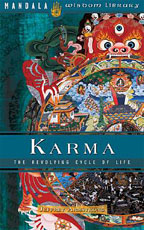"Once we include the bigger questions of nature, our own eternal nature and the intention of the Supreme Being into the question of cause and effect, karma becomes a pivotal part of a much larger conversation. If, as the Vedas suggest, we really are eternal beings, then the things that we do by using our free will have the potential to unfold over very long periods of time, with very complex consequences. If we extend the boundary of our thinking beyond the limits of just one lifetime, then our continual reincarnation appears to be directed by the cause and effect that result from our personal choices and actions. In that case, cause and effect need to be studied over many lifetimes, and justice, or the balancing of the scales of action and reaction, will be played out over a much longer period of time. Such a view will also include a system of administration of cause and effect, some method by which the delivery of so many causal chains is interwoven and connected.
"This is the rationale behind the ancient science of Jyotisha, or Vedic Astrology, which is very different from the astrology as entertainment we often see today. According to Vedic Astrology, if we are souls investing our free will through actions, then a trail of reactions is always following along behind us as the delayed result of our actions. It also follows that somewhere in us and the universe, there must be a record-keeping department concerned with the balancing of the cosmic books. Someone and something must be monitoring the delivery of the results of the actions of all these humans who are using free will to invest in certain kinds of work. The theory behind astrology then is that encoded in the positions of the planets and stars at the location and moment of birth is information about the nature and delivery schedule of the past actions carried by each soul. The delivery of that cause and effect is carried out by divine helpers working on behalf of the Supreme Being.
"This means that some but not all of our life is predetermined by our previous use of free will. It means that the Divine Intelligence of the universe has a longer memory than us and that 'what goes around comes around' may be on a longer trajectory than we have so far imagined. The greatness of karma as a philosophical concept and practical understanding is that it sees a soul's journey of evolution on a very grand scale. It is a view that envisions the continual evolution of countless trillions of souls over vast stretches of space and tremendous eras of cosmic time. You could say that karma is the judicial system of a great intergalactic federation of democratic action run by free will in a context of Divine law.
"Seen from this perspective, each time we take on a body or are born again as a human, we are both receiving old karma and creating new karma. Finally, this also raises the questions of whether or not, and how, we might escape the limitations and suffering of this cycle of cause and effect and be restored to our original nature, which the Vedas depict as an eternal joyful soul in a transcendental world. Since cause and effect appear to us as a cycle, they may be viewed as a circle. We initiate an action and at a certain time in the future, we reap the fruit of our deeds. It resembles the agricultural cycle in the circle of the year. We sow seeds and then garner the rewards — 'As you sow, so you shall reap.' Karma is the science of our actions and their outcomes.
"The larger process of the soul transmigrating from life to life and body to body over many lifetimes is called samsara in Sanskrit, the wheel of repeated birth and death from life to life. The concept of karma then includes both the short-term cause and effect cycle — the moral consequences implied in 'do unto others as you would have them do unto you' — and the long-term evolution of all the souls over many lifetimes. As we will see, the implications of this view form a grand and profound cosmology that is the basis of what we have come to think of as the 'Eastern' view, a view deeply influenced by Vedic thought. Now, due to the effects of technology, East and West have not only met, they are increasingly part of one world that we are changing very rapidly by all we do. Our current level of ability to alter the balance of natural law calls into question everything we do. At present we are gambling with our children's futures and perhaps the future of life on our planet. Never has there been a time when an understanding of karma was more relevant than it is today."
